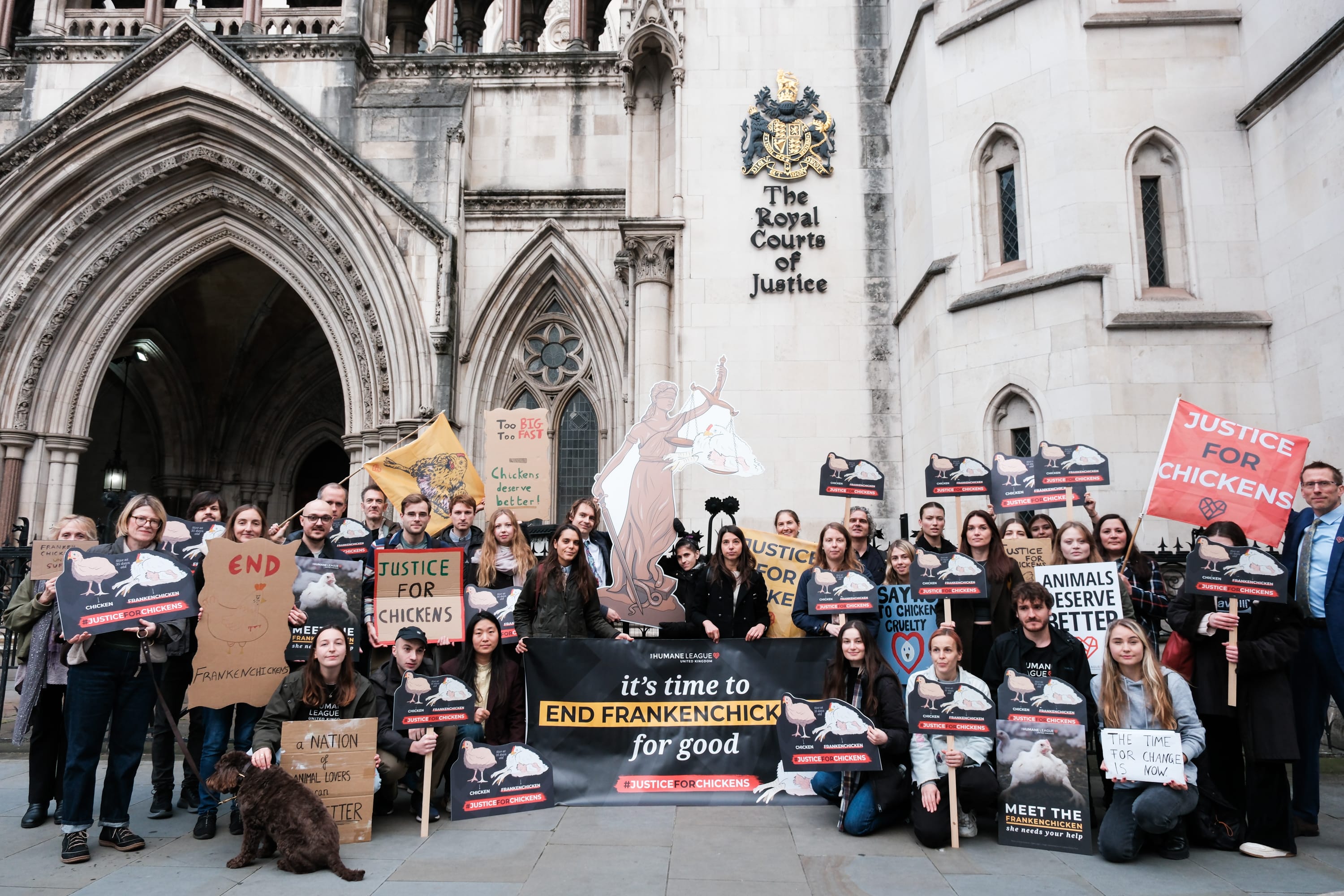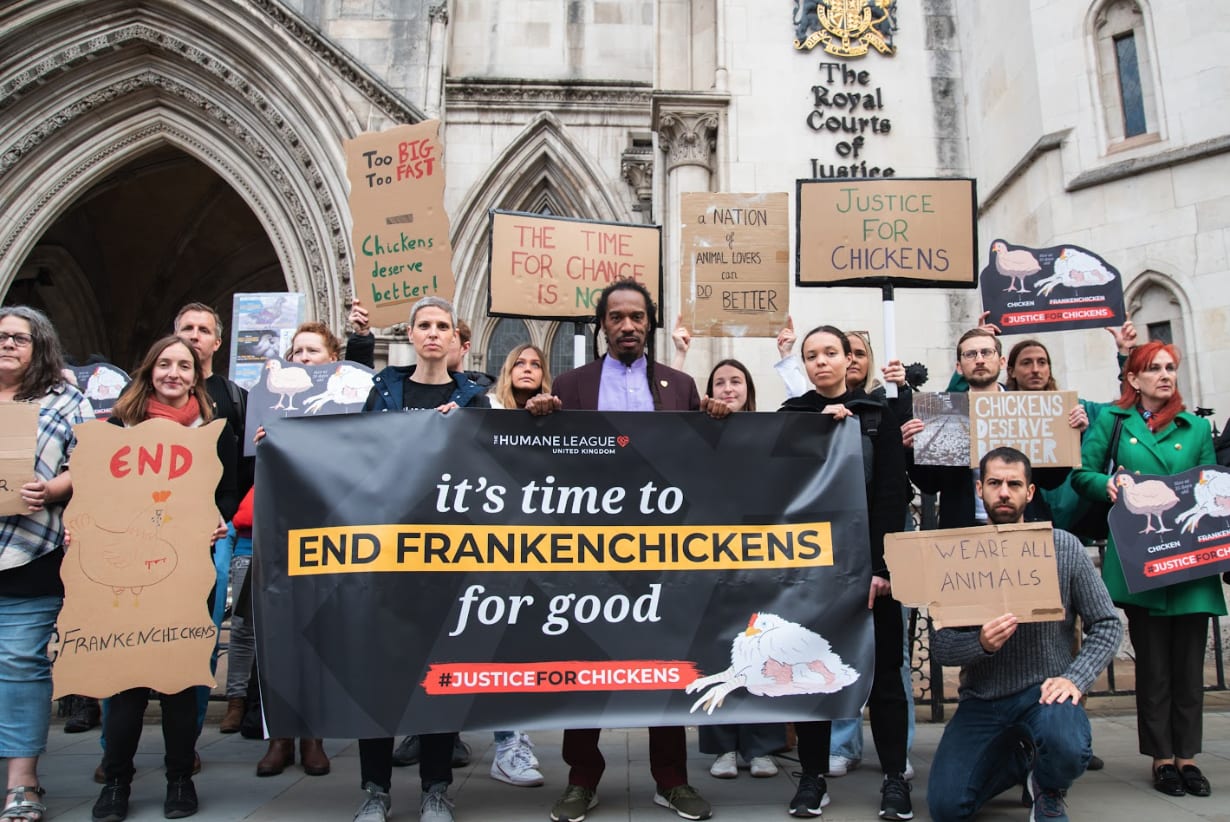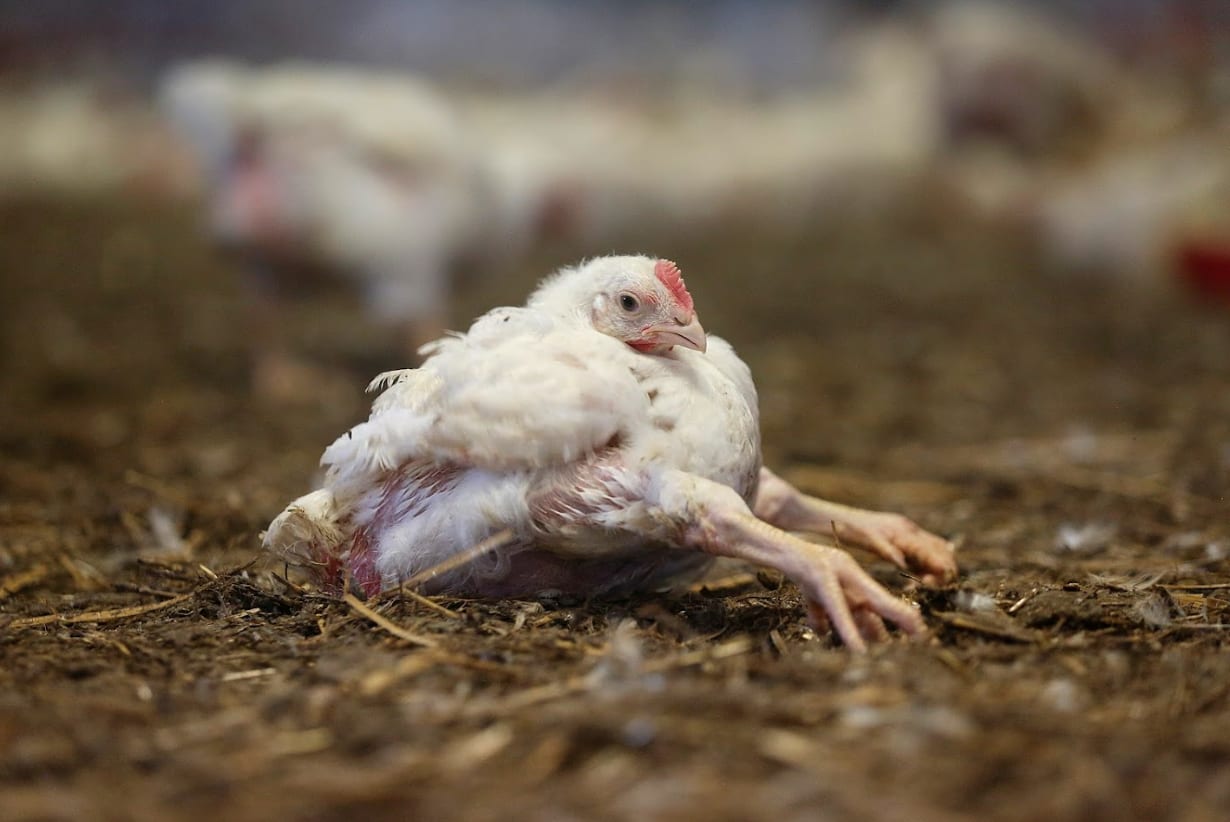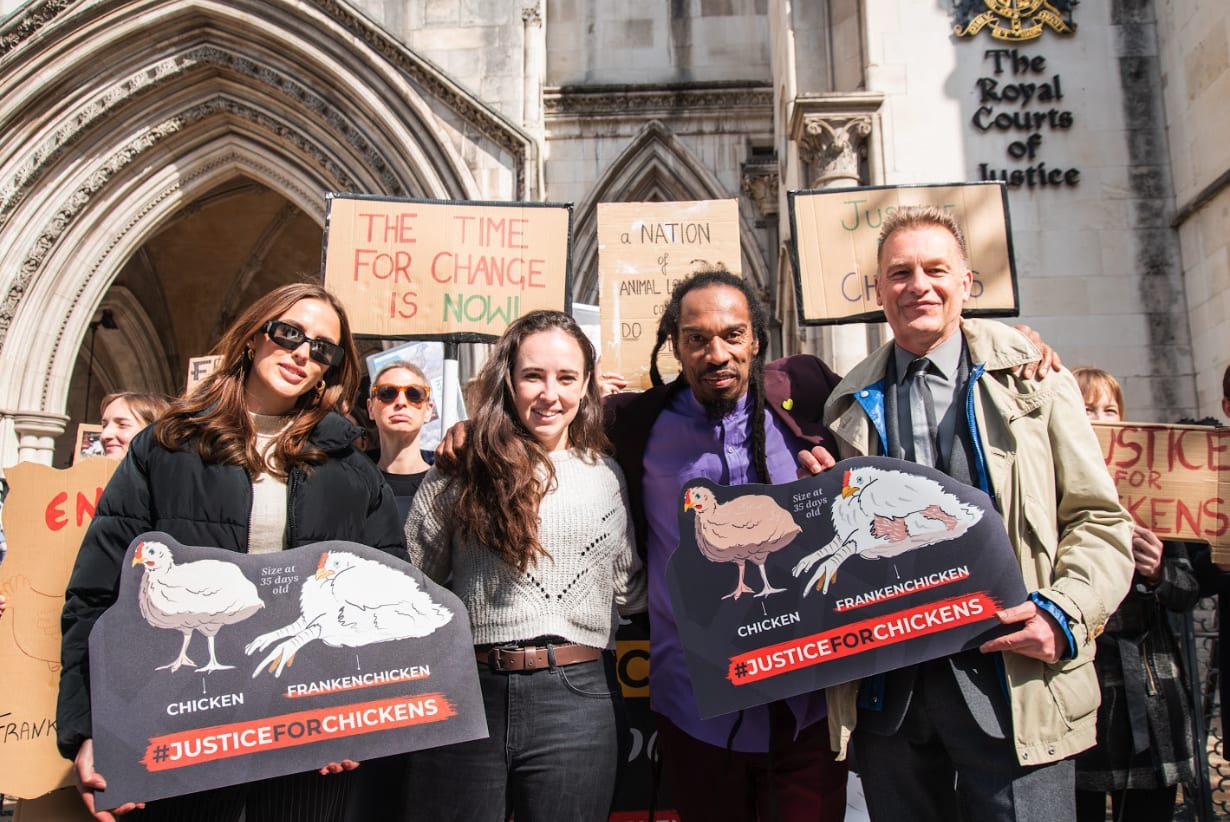UPDATE:
A dedicated team of The Humane League UK staff members, volunteers, trustees, and supporters gathered last week outside The Royal Courts of Justice to protest against the use of fast-growing chicken breeds.
The two-day hearing was groundbreaking. Top legal experts in the country carefully examined what the law means when it prohibits keeping farm animals that suffer due to their genes.
We hope the court rules in favour of clearer, enforceable protections—for the farmers, for us, and most importantly, for the chickens.
Now we wait for a verdict.
Update on our legal challenge appealIf you are interested in the legal intricacies of the hearing itself, you can watch a livestream or recording of proceedings.
You can also read more information about our hearing through articles from the BBC, the Mirror, and PA media outlets.

We have a once-in-a-generation opportunity to improve the lives of chickens raised for food in the UK.
Today and tomorrow, The Humane League UK (THL UK) are in the High Court to challenge the legality of fast-growing breeds of chicken- Frankenchickens. At stake are the lives of one billion animals.
Our small team demonstrated outside the courts this morning. Inside, our legal team, Advocates for Animals, are arguing that farming Frankenchickens breaches the Welfare of Farmed Animals (England) Regulations 2007.
We are up against huge opposition with The Government, the British Poultry Council, and the National Farmers’ Union representing the interests of the £3 billion poultry industry. This really is a David versus Goliath case.

Frankenchickens
‘Frankenchickens’ are selectively bred to grow unnaturally big and fast to maximise profits. They are destined to suffer extremely short and painful lives, suffer heart attacks, are often unable to walk and succumb to open sores from lying in their own waste. They grow 400% faster than is natural for their bodies, creating the biggest animal welfare crisis of our time.
In the UK alone, there are over 1 billion chickens raised for meat and over 90% are fast-growing.

THL UK's three-year legal battle
In 2020, we saw an opportunity to challenge the legality of Frankenchickens and began building a legal case against the Department for Environment, Food & Rural Affairs (Defra).
This culminated in a judicial review taking place at the High Court in May 2023. Getting to this point was a major success in itself as only 5% of cases are granted a full hearing. The judge stated that a full hearing of the facts regarding fast-growing chickens was in the public interest.
Represented by Advocates for Animals, we argued that fast-growing chicken breeds, known as Frankenchickens, are illegal under current animal welfare laws, as they suffer as a direct result of their breeding. Our case was bolstered by evidence given by the RSPCA which shows that fast-growing breeds of chicken do suffer, no matter the environment they’re raised in. This was despite Defra attempting to block the submission of the RSPCA’s evidence.

The fight continues
In May 2023, the High Court ruled that Defra hadn’t behaved unlawfully in their interpretation of the Welfare of Farmed Animals Regulation of 2007.
Shortly after the ruling we decided to appeal the court’s decision and continue our three-year legal battle.
There is overwhelming scientific consensus that chickens raised for meat suffer due to their breed. Defra itself has offered no evidence to contradict the RSPCA report and even accepted that there are welfare problems with fast-growing breeds of chicken.
In October 2023, we found out that our appeal had been granted.
Our court hearing took place over two days, Wednesday 23rd and Thursday 24th October.
This is a once-in-a-generation opportunity to force the Government, with one decision from an appeals court judge, to transform one billion innocent lives per year.
Our chances of success
By virtue of being granted an appeal, our chances for a favourable final outcome have increased significantly. Being granted an appeal means that serious problems with the previous judge’s findings have been uncovered, and the judge approving our appeal thinks our case still has merit that needs final and careful deliberation.
A positive ruling would mean that the judge found Defra's interpretation of the Welfare of Farmed Animals Regulation of 2007 illegal, and would compel them to create a new policy on fast-growing breeds of chicken, one that would invariably lead to farmers being disincentivized or even banned from keeping fast-growing birds. Essentially, Defra would be forced by the courts to move against the use of fast-growing breeds. What that looks like in terms of actual policy implementation would become clear in due course after the hearing.
Whilst we are confident that we have the facts to support our case and win, even if we don’t win, we have another opportunity to continue the debate and discussion about Frankenchickens in the public arena, to raise further awareness and garner more support as we continue to work toward a more compassionate world without fast-growing breeds of chicken.
During our previous court hearing, we secured more broadcast media coverage in the two days of the case than we did in the previous 12 months, sparking a national conversation about the cruelty of breeding Frankenchickens and making it the single biggest media impact of any action since our inception, with a potential reach of over 350 million people.
Support The Humane League UK
Should you wish to donate to The Humane League UK, or learn more about our work, then please contact me directly:
- Molly Archer-Zeff, Major Gifts Coordinator, THL UK
- marcherzeff@thehumaneleague.org.uk
The Humane League UK
The Humane League UK is a UK registered charity working to end the abuse of animals raised for food.
Whilst we’re still a fairly young organisation, we have already achieved some big wins for the animals. This is one of the reasons why we, as part of THL, are recommended by Animal Charity Evaluators (ACE) as one of the most effective animal protection organisations in the world.
THL is the only organisation to have been recommended every year in the history of ACE’s reviews. Their continued endorsement underscores our effectiveness and commitment to creating a better world for animals. They have evaluated us to be an ‘exceptional’ example of effective advocacy:
‘Giving to THL is an excellent opportunity to support initiatives that create the most positive change for animals.’

This is one of the most exciting things I've seen on the forum all year, amazing work.
It also re-affirms for me that court cases can be one of the most effective ways to both make progress and raise awareness. Many climate wins in the last few years have been through the law.
On that note apropros of everything while also being completely off topic...
...Can someone please sue Open AI?
I'm surprised at the downvotes (8 karma from 11 votes currently) - I have no legal background so no idea whether suing OpenAI would be a good idea or at all viable, but even if it is not Nick's comment seems kind and good to me!
Thanks Oscar appreciate this, although I'm personally fortunate to not be too bothered taking karma hammerings at times ;). I've noticed (I think, could be wrong) that anti Open-AI comments often get a number of downvotes (as well as upvotes). Also to be fair my "Sue open AI" quip is largely off topic as well so some downvotes probably warranted ;).
Could you please do an update, if convenient enough for it to be worth it?
We will certainly do an update when we have information about the verdict. We may not hear any new information for a few weeks but as soon as we have news, we will update you all!
Great news!
I'm curious though if there has been any work done on the welfare math of this? Frankenchickens suffer more individually due to their size, but greater size also means less individual chickens are needed to satisfy demand. Furthermore, faster growth means less time spent alive and, presumably, suffering - or maybe more time, if slaughter makes up a large fraction of it?
It seems likely to me that Frankenchickens do entail more suffering and that banning them would mean less regardless, as increasing cost of production also lowers demand; plus the campaign is a good movement building endeavor. However, it would still be good to understand how much of priority this is relative to other policy changes.
Hi Dylan,
In response to your question, this RSPCA report explores the question of fast-growing breeds of broiler chicken. They highlighted the intense suffering that these birds face and the inefficiencies of this system of farming. It is a 36-page report so here are a few key bits of the text:
The Welfare Footprint Project used the Cumulative Pain Framework to investigate how the adoption of the Better Chicken Commitment (BCC) and similar welfare certification programs affect the welfare of broilers. Specifically, they examined concerns that the use of slower-growing breeds may increase suffering by extending the life of chickens for the production of the same amount of meat. From their main findings they stated:
'Our results strongly support the notion that adoption of BCC standards and slower-growing broiler strains have a net positive effect on the welfare of broiler chickens. Because most welfare offenses endured by broilers are strongly associated with fast growth, adoption of slower-growing breeds not only reduces the incidence of these offenses but also delays their onset. As a consequence, slower-growing birds are expected to experience a shorter, not longer, time in pain before being slaughtered.'
You can also read our own white paper on the welfare of broiler chickens.
I hope that helps answer your question.
Hooray - this is awesome work. Fight the good fight.
I donated to THL last year because of this case; was advised by Founders Pledge that without funding the appeal might fall through and was keen for that not to happen. I wonder what other time-sensitive efforts in this space with room for more funding?
We are extremely grateful for your donation Henry, our supporters make this work possible!
In response to your question about room for funding, we’re currently facing a funding gap for this year and donations are vital for allowing us to continue our work on our priorities over the next 3 years. Our key priorities are:
Priority 1) We want to see tangible changes in chicken farming practices, with companies making new commitments, increased transparency, and a shift from standard factory farming of chickens towards the Better Chicken Commitment. We aim to shift even more of the UK market share towards the Better Chicken Commitment standards - from approximately 28% in 2023, to 40% in 2027.
Priority 2) We will make sure that companies who pledged to go cage-free by 2025 are following through on this promise. We aim to ensure that by 2027, 90% of hens are free from cages in the UK, ideally in free-range and organic systems.
Priority 3) Our goal is to ensure the UK and Scottish governments have incorporated stunning for farmed fishes into legislation by 2027; and build towards an impactful corporate meat-reduction campaign by 2030.
I entirely support your cause, while is there any similar regulation to avoid the importation of Frankenchicken meat? In animal welfare, for me the most important policy is to support protectionism in the meat/dairy/eggs markets. Animal welfare activist and farmers have a common enemy: imports.
https://forum.effectivealtruism.org/posts/L6wdRBCh3izCD244t/farmers-in-the-animalist-coalition
While regulation would be best,[1] commitments still make a case like this incredibly useful. The Humane League and the Better Chicken Commitment have been working on getting corporations to commit to use better breeds. It might be easier to (1) commit to using better breeds and (2) actually follow through with that commitment[2] if all UK producers have to switch to better breeds.
See API's work on that here
See Lewis Bollard's remarks on that here
You're certainly right that imports are a problem. As they are the most widely used breed globally, the vast majority of imported chicken meat to the UK will be from Frankenchickens. So there are unfortunately no regulations about importing Frankenchickens currently.
Is here anything I can do to help?
Of course! Sharing content about our legal challenge on your social media pages will help spread awareness within your network. You can also help by donating to THL UK.
This seems like a great campaign with a chance of raising awareness at least or leading to legal changes if it succeeds - and I hope you get a good result at the trial. I had a question about something else the Humane League was involved in, though, which is that in this article the League was mentioned in the issue of Defra's policy on chickens being carried by their feet was described as a new Labour policy decision, but in this article discussing the issue a few months ago, also mentioning the League, it was presented as a decision by the Conservative government. It seems like they can't both have created this policy - so is it true that both major parties in the UK are against basic animal rights, or is this previous decision more nuanced than that?
Thanks for the question!
The chicken handling (carrying chickens by their legs) was investigated by the Animal Welfare Committee, which is an independent body that advises the Government irrespective of if it is a Labour Government or a Conservative Government). Essentially as it stands, it is illegal to carry chickens by their legs but it is permitted in the codes of practice (and is a carrying method we believe is widely used). The AWC recommended that the law be changed to allow carrying chickens by the legs. This recommendation came out under the previous Government, but they didn't make a policy decision on this before the election. Now that we have a new Government, a policy decision has been made.
Executive summary: The Humane League UK is challenging the legality of fast-growing chicken breeds ("Frankenchickens") in the UK High Court, aiming to improve the lives of one billion chickens raised for food annually.
Key points:
This comment was auto-generated by the EA Forum Team. Feel free to point out issues with this summary by replying to the comment, and contact us if you have feedback.
NOTICE: there's a very similar court case also happening, this one in Colerado:
Ground News - Should elephants have the same rights as people? A Colorado court may decide